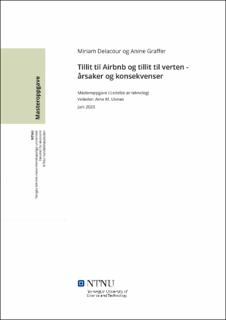| dc.contributor.advisor | Ulvnes, Arne M. | |
| dc.contributor.author | Delacour, Miriam | |
| dc.contributor.author | Graffer, Anine | |
| dc.date.accessioned | 2021-09-14T17:15:13Z | |
| dc.date.available | 2021-09-14T17:15:13Z | |
| dc.date.issued | 2020 | |
| dc.identifier | no.ntnu:inspera:55685251:60460602 | |
| dc.identifier.uri | https://hdl.handle.net/11250/2777155 | |
| dc.description.abstract | Ved hjelp av teknologisk utvikling innen digitalisering blir ubrukte ressurser utnyttet mer effektivt gjennom økt delingsatferd. Delingsatferd baserer seg på stor grad av samarbeid mellom tilbyder og etterspørrer, samt distributøren som tilrettelegger for at delingstransaksjoner kan finne sted i stor skala. Airbnb er en nettbasert delingsaktør som samler verter og gjester under en felles plattform, og formidler korttidsleie mellom partene innen det private markedet. Trepartssamarbeidet innebærer mer risiko og er mer sammensatt sammenliknet med tradisjonelle e-transaksjoner, og dermed kreves det systemer som fremmer tillit i enda større grad innen delingsøkonomien (Wu og Shen, 2018).
Avhandlingen baserer seg på to kategorier av tillit; tillit til selger (vert) og tillit til organisasjon (Airbnb). Denne masteroppgavens målsetting er å undersøke hvordan kundenes opplevelser og erfaringer med Airbnb og verter bidrar til både tillit og positiv word-of-mouth om Airbnb. I denne masteroppgaven definerer vi word-of-mouth som uformell kommunikasjon mellom privatpersoner om en tjeneste (Jalilvand og Samiei, 2012). På bakgrunn av dette skal avhandlingen besvare følgende problemstilling; Hvordan vil tillit og tilknytning til Airbnb og vert, samt positiv word-of-mouth hos Airbnbs kunder bli påvirket av prisverdi, IT-sikkerhet, IT-kvalitet, kommunikasjon og gjenkjennelighet? For å besvare problemstillingen ble det valgt kausalt forskningsdesign med en tilhørende kvantitativ tilnærming. Avhandlingens forskningsmodell utgjør det teoretiske rammeverket i avhandlingen.
Analysen vår finner empirisk støtte for at IT-sikkerhet har positiv effekt på kundenes tillit til Airbnb. Det har blitt avdekket delvis støtte for kausalsammenheng mellom prisverdi og tillit til Airbnb, samt mellom tillit til vert og tillit til Airbnb. Kommunikasjon og gjenkjennelighet med vert har positiv påvirkning på tillit til verten. Videre har vi funnet delvis støtte for kausalsammenhengen tillit til Airbnb og tillit til vert. Studien viser delvis støtte til sammenhengen mellom tillit til Airbnb og tilknytning til Airbnb, samt mellom tillit til Airbnb og tilknytning til vert. Delvis støtte finnes også for en årsak-virkningssammenheng mellom tillit til vert og tilknytning til Airbnb. Full støtte for en positiv sammenheng mellom kundenes tilknytning til Airbnb og positiv word-of-mouth er funnet. | |
| dc.description.abstract | Through technological advancement within digitalisation, unused resources are being utilized more effectively with an increased sharing behaviour. Sharing behavior is based on the collaboration between a provider and consumer demand, as well as the distributor who facilitates the sharing transactions, thus ensuring it can operate on a large scale. Airbnb is an online sharing platform which gathers hosts and guests and provides short-term rentals between those parties in the private market. The collaboration between the three parties involves more risk and is more complex when compared to traditional e-transactions, and so it requires systems that focus on trust within this part of the sharing economy (Wu og Shen, 2018).
This thesis is based on two categories of trust; trust in the seller (the host) and trust in the organization (Airbnb). The aim of this dissertation is to investigate how customers’ experiences with Airbnb and the hosts contribute to both trust and positive word of mouth about Airbnb. In this thesis, ‘word of mouth’ will be defined as informal communication between individuals regarding a service (Jalilvand og Samiei, 2012). With this in mind, this dissertation will be answering the following question; How is trust and attachment with Airbnb and the host, as well as positive word-of-mouth of Airbnb’s customers influenced by price value, IT security, IT quality, communication and familiarity? To explore this question we chose to employ causal research design with an associated quantitative approach. The thesis’ research model constitutes the theoretical framework of the dissertation.
Based upon empirical evidence, our analysis finds that IT security has a positive effect on the customers’ trust in Airbnb. In addition, partial support has been found for a casual connection between the price value and trust in Airbnb, as well as trust in the host and trust in Airbnb. Communication and familiarity with the host has a positive influence on trust towards the host. We also found partial support for a casual connection between the trust in Airbnb and trust in the host. This study shows partial support for the connection between the trust in Airbnb and attachment to Airbnb, and between trust in Airbnb and attachment to the host. Partial support also exists for a cause-and-effect connection between trust in the host and attachment to Airbnb. Full support has been found regarding the customers’ attachment to Airbnb and positive word-of-mouth. | |
| dc.language | | |
| dc.publisher | NTNU | |
| dc.title | Tillit til Airbnb og tillit til verten - årsaker og konsekvenser | |
| dc.type | Master thesis | |
